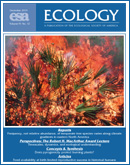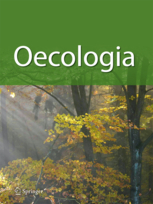External links
| | This article about a journal on environmental social science is a stub. You can help Wikipedia by expanding it. See tips for writing articles about academic journals. Further suggestions might be found on the article's talk page. |
The International Journal of Ecology & Development is a scientific journal published by the Indian Society for Development and Research that was established to cover "research and developments in ecology and development." The editor-in-chief is Kaushal K. Srivastava. It has been published since 2005 and is included in Scopus.

Human ecology is an interdisciplinary and transdisciplinary study of the relationship between humans and their natural, social, and built environments. The philosophy and study of human ecology has a diffuse history with advancements in ecology, geography, sociology, psychology, anthropology, zoology, epidemiology, public health, and home economics, among others.
Industrial ecology (IE) is the study of material and energy flows through industrial systems. The global industrial economy can be modelled as a network of industrial processes that extract resources from the Earth and transform those resources into products and services which can be bought and sold to meet the needs of humanity. Industrial ecology seeks to quantify the material flows and document the industrial processes that make modern society function. Industrial ecologists are often concerned with the impacts that industrial activities have on the environment, with use of the planet's supply of natural resources, and with problems of waste disposal. Industrial ecology is a young but growing multidisciplinary field of research which combines aspects of engineering, economics, sociology, toxicology and the natural sciences.

Sir Arthur George Tansley FLS, FRS was an English botanist and a pioneer in the science of ecology.
Macroecology is the subfield of ecology that deals with the study of relationships between organisms and their environment at large spatial scales to characterise and explain statistical patterns of abundance, distribution and diversity. The term was coined in a small monograph published in Spanish in 1971 by Guillermo Sarmiento and Maximina Monasterio, two Venezuelan researchers working in tropical savanna ecosystems and later used by James Brown of the University of New Mexico and Brian Maurer of Michigan State University in a 1989 paper in Science.

Ecology is a scientific journal that publishes research and synthesizes papers in the field of ecology. It was founded in 1920 as the continuation of Plant World, and is published by the Ecological Society of America. According to the Journal Citation Reports, it is currently ranked 15th out of 136 journals in the Ecology category.
The Journal of Ecology is a bimonthly peer-reviewed scientific journal covering all aspects of the ecology of plants. It was established in 1913 and is published by Wiley-Blackwell on behalf of the British Ecological Society.

The Ecological Society of America (ESA) is a professional organization of ecological scientists. Based in the United States and founded in 1915, ESA publications include peer-reviewed journals, newsletters, fact sheets, and teaching resources. It holds an annual meeting at different locations in the USA and Canada. In addition to its publications and annual meeting, ESA is engaged in public policy, science, education and diversity issues.
Frederic Edward Clements was an American plant ecologist and pioneer in the study of plant ecology and vegetation succession.
Ecological systems theory is a broad term used to capture the theoretical contributions of developmental psychologist Urie Bronfenbrenner. Bronfenbrenner developed the foundations of the theory throughout his career, published a major statement of the theory in American Psychologist, articulated it in a series of propositions and hypotheses in his most cited book, The Ecology of Human Development and further developing it in The Bioecological Model of Human Development and later writings. A primary contribution of ecological systems theory was to systemically examine contextual variability in development processes. As the theory evolved, it placed increasing emphasis on the role of the developing person as an active agent in development and on understanding developmental process rather than "social addresses" as explanatory mechanisms.
CSIRO Publishing is an Australian-based science and technology publisher. It publishes books, journals and magazines across a range of scientific disciplines, including agriculture, chemistry, plant and animal sciences, natural history and environmental management. It also produces interactive learning modules for primary school students and provides writing workshops for researchers.
Feminist political ecology is a feminist perspective on political ecology, drawing on theories from Marxism, post-structuralism, feminist geography, ecofeminism and cultural ecology. Feminist political ecology examines the place of intersectional social relations in the political ecological landscape, exploring them as a factor in ecological and political relations. Specific areas in which feminist political ecology is focused are development, landscape, resource use, agrarian reconstruction and rural-urban transformation. Feminist political ecologists suggest gender is a crucial variable – in relation to class, race and other relevant dimensions of political ecological life – in constituting access to, control over, and knowledge of natural resources.

Oecologia is an international peer-reviewed English-language journal published by Springer since 1968. The journal publishes original research in a range of topics related to plant and animal ecology.
Bosque is a scientific journal published by the Forestry Faculty of the Southern University of Chile. It publishes articles on a wide range of forestry-related topics, primarily on issues that are relevant to Chile, Latin America and the Southern Hemisphere. The published articles include peer-reviewed scientific research papers, items of current interest and opinion pieces. Bosque's first issue was published in 1975 and the journal was issued yearly until 1985. From 1985 to 2003 it was issued twice a year and from 2003 on three times a year. The topics covered in Bosque are management and production of forestry resources, wood science and technology, silviculture, forest ecology, natural resources conservation, and rural development associated with forest ecosystems. The journal publishes research articles, notes and opinions, both in Spanish and English. Bosque was included in the Science Citation Index Expanded in 2009. The journal is also indexed in The Zoological Record.
Journal of Applied Ecology is a monthly peer-reviewed scientific journal publishing research in all areas of environmental management. It was established in 1964 and is published by Wiley on behalf of the British Ecological Society. The Senior Editors are Jos Barlow, Nathalie Pettorelli, Philip Stephens, Martin Nuñez and Romina Rader.

Behavioral Ecology is a bimonthly peer-reviewed scientific journal published by Oxford University Press on behalf of the International Society for Behavioral Ecology. The journal was established in 1990.